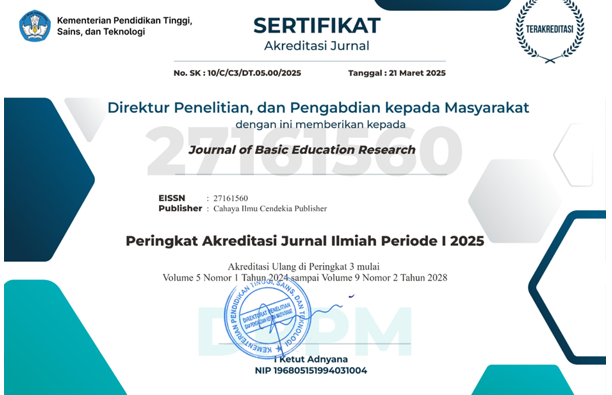Assessing the Resilience and Preparedness of Basic Education Teachers for Distance Learning During the Covid-19 Pandemic in Surigao del Sur, Philippines
Abstract
Purpose of the study: This study assesses the preparedness, challenges, and coping mechanisms of basic education teachers in Surigao del Sur, Philippines, for online learning during the Covid-19 pandemic.
Methodology: A descriptive-evaluative quantitative design was employed, surveying 1,281 professional teachers from the divisions of Tandag City, Bislig City, and Surigao del Sur. Participants were selected through stratified and simple random sampling. Data were collected using a validated questionnaire and analyzed through correlation tests and one-way ANOVA in R and Jamovi software.
Main Findings: Findings indicate that most teachers were moderately prepared for online learning but faced significant challenges, including limited access to technology, poor internet connectivity, and insufficient resources. Teacher readiness was strongly correlated with effective coping mechanisms, underscoring the importance of institutional support, collaboration, and adaptability. This study provides localized insights into the experiences of rural educators in the Philippines during a health crisis, emphasizing resilience and institutional backing in sustaining education.
Novelty/Originality of this study: By highlighting the critical role of preparedness and adaptability, it offers practical recommendations for enhancing teacher support systems and mitigating future educational disruptions.
References
N. AlQashouti, M. Yaqot, R. E. Franzoi, and B. C. Menezes, “Educational system resilience during the COVID-19 pandemic—review and perspective,” Educ. Sci., vol. 13, no. 9, p. 902, Sep. 2023, doi: 10.3390/educsci13090902.
M. B. Ulla and J. S. Achivar, “Teaching on facebook in a university in thailand during the COVID-19 pandemic: A collaborative autoethnographic study,” Asia-Pacific Soc. Sci. Rev., vol. 21, no. 3, Sep. 2021, doi: 10.59588/2350-8329.1393.
L. Egan, H. Park, J. Lam, and J. Gatt, "Resilience to stress and adversity: a narrative review of the role of positive affect," Psychol. Res. Behav. Manag., vol. 17, pp. 2011–2038, May 2024, doi: 10.2147/PRBM.S391403.
C. G. Zara et al., "Exploring the concept of pedagogical resilience during the covid-19 pandemic: teachers’ perspectives from Thailand and the Philippines," Front. Educ., vol. 7, Aug. 2022, doi: 10.3389/feduc.2022.981217.
A. Raghavan, M. A. Demircioglu, and A. Taeihagh, “Public health innovation through cloud adoption: A comparative analysis of drivers and barriers in Japan, South Korea, and Singapore,” Int. J. Environ. Res. Public Health, vol. 18, no. 1, p. 334, Jan. 2021, doi: 10.3390/ijerph18010334.
I. A. L. Ramirez, “Teaching Preparedness of Pre-Service Teachers: Perception to Practice,” Int. J. Stud. Educ. Sci., 2020.
A. G. V. Rotherson A. Ortega and W. S. Gilongos, “An analysis of the performance level of non-education teacher graduates in the K-12 program,” Int. J. Res. Eng. Sci., vol. 10, no. 3, pp. 86–91, 2022.
L. B. Leal, “Challenges and coping mechanisms of secondary school heads during the Covid-19 Pandemic,” 2022.
Y.-H. Ye and Y.-H. Shih, “Strategies for improving professional development of teachers in primary and secondary schools in Taiwan after the implementation of 12-year basic education curriculum,” Univers. J. Educ. Res., vol. 8, no. 12A, pp. 7350–7358, Dec. 2020, doi: 10.13189/ujer.2020.082519.
L. Judilla and J. Rellon, “Teacher resilience and professional development trainings as predictors of teaching capacity in public schools: a convergent approach,” Cent. Mindanao Coll., 2022.
S. G. Ciucă and E. A. Zăvoianu, “Enhancing resilience in primary education: addressing societal challenges and fostering holistic student development,” Rev. Rom. pentru Educ. Multidimens., vol. 16, no. 1, pp. 495–505, Mar. 2024, doi: 10.18662/rrem/16.1/834.
R. Larasati and P. Kuswandono, “Enhancing teachers’ resilience through teacher professional development,” Lang. Circ. J. Lang. Lit., vol. 17, no. 2, pp. 391–402, Apr. 2023, doi: 10.15294/lc.v17i2.42673.
C. G. Zara, F. Balazon, T. Wangdi, W. F. Perales, P. Praditson, and M. B. Ulla, "Exploring the concept of pedagogical resilience during the COVID-19 pandemic: Teachers’ perspectives from Thailand and the Philippines," Frontiers in Education, vol. 7, p. 981217, Aug. 2022. doi: 10.3389/feduc.2022.981217.
D. Clesel D. Reyes, F. M. S. Valmorida, M. F. Alayon, A. J. D. Tantog, and A. C. C. Telos, "Teachers' strategies, challenges and coping mechanisms in helping struggling readers during the pandemic," Int. J. Acad. Multidiscip. Res., vol. 7, no. 2, pp. 296–304, 2023.
I. W. Dharmayana and A. A. Herawati, "Descriptive evaluative study on the implementation of online learning during the COVID-19 pandemic in the courses of guidance and counseling profession," 2021. [Online]. doi: 10.2991/assehr.k.210227.085.
J. A. De Villa and F. K. B. Manalo, "Secondary teachers' preparation, challenges, and coping mechanism in the pre-implementation of distance learning in the new normal," IOER Int. Multidiscip. Res. J., vol. 2, no. 3, pp. 144–154, 2020.
R. She, K. Wong, J. Lin, Y. Zhang, K. Leung, and X. Yang, "Profiles of stress and coping associated with mental, behavioral, and internet use problems among adolescents during the COVID-19 pandemic: A stratified random sampling and cluster analysis," Front. Public Health, vol. 10, Mar. 29, 2022. [Online]. doi: 10.3389/fpubh.2022.826911.
S. Noor, O. Tajik, and J. Golzar, "Simple random sampling," Int. J. Educ. Lang. Stud., vol. 1, no. 2, pp. 78–82, 2022. doi: 10.22034/ijels.2022.162982.
J. F. Kiong, “The impact of technology on education: A case study of schools,” Journal of Education Review Provision, vol. 2, no. 2, pp. 65–75, 2022.
A. Afzal, S. Khan, S. Daud, Z. Ahmad, and A. Butt, “Addressing the digital divide: Access and use of technology in education,” Journal of Social Sciences Review, vol. 3, no. 2, pp. 883–895, 2023.
Q. Fu and X. Zhang, “Promoting community resilience through disaster education: Review of community-based interventions with a focus on teacher resilience and well-being,” PLoS One, vol. 19, no. 1, p. e0296393, 2024.
Q. Gu and C. Day, “Teachers’ resilience: A necessary condition for effectiveness,” Teaching and Teacher Education, vol. 23, no. 8, pp. 1302–1316, 2007.
S. Raghunathan, A. Darshan Singh, and B. Sharma, "Study of resilience in learning environments during the Covid-19 pandemic," Front. Educ., vol. 6, Jan. 2022, doi: 10.3389/feduc.2021.677625.
M. Aristeidou and S. Cross, “Disrupted distance learning: The impact of COVID-19 on study habits of distance learning university students,” Open Learning: The Journal of Open, Distance and e-Learning, vol. 36, no. 3, pp. 263–282, 2021.
W. Leal Filho et al., “Impacts of COVID-19 and social isolation on academic staff and students at universities: A cross-sectional study,” BMC Public Health, vol. 21, no. 1, p. 1213, 2021.
Z. Wang and B. Zheng, “Achievement emotions of medical students: Do they predict self-regulated learning and burnout in an online learning environment?,” Medical Education Online, vol. 28, no. 1, p. 2226888, 2023.
T. J. F. Klapproth, L. Federkeil, and F. Heinschke, "Teachers’ experiences of stress and their coping strategies during COVID-19 induced distance teaching," J. Pedagog. Res., vol. 4, 2020.
F. Ghasemi, K. C. Herman, and W. M. Reinke, "Shifts in stressors, internalizing symptoms, and coping mechanisms of teachers during the COVID-19 pandemic," School Ment. Health, vol. 15, no. 1, pp. 272–286, Mar. 2023, doi: 10.1007/s12310-022-09549-8.
A. P. Maribel Alejandrino and M. Elbanbuena, "Readiness, challenges and coping mechanism of junior high school students toward face-to-face learning," 2023.
A. Zuyeva, "Coping strategies as determinants of readiness for age-related changes," Social. Hum. Dev. Int. Sci. J., pp. 102–108, Dec. 2019, doi: 10.37096/SHDISJ-19-1.1-0012.
T. Pittman and T. Gaines, "Technology integration in third, fourth and fifth grade classrooms in a Florida school district," Educ. Technol. Res. Dev., vol. 63, no. 4, pp. 539–554, Aug. 2015, doi: 10.1007/s11423-015-9391-8.
C. Buabeng-Andoh, "Factors influencing teachers’ adoption and integration of information and communication technology into teaching: A review of the literature," vol. 8, no. 1, 2012.
A. A. Lapada, F. F. Miguel, D. A. R. Robledo, and Z. F. Alam, “Teachers’ Covid-19 Awareness, Distance Learning Education Experiences and Perceptions towards Institutional Readiness and Challenges,” Int. J. Learn. Teach. Educ. Res., vol. 19, no. 6, pp. 127–144, Jun. 2020, doi: 10.26803/ijlter.19.6.8.
R. F. P. Dennis G. Caballes, “Teachers’ Readiness Level on Online Teaching: Embracing Distance Learning Modality,” Ciit Int. J. Softw. Eng. Technol., vol. 12, no. 4, 2020.
Y. Tas, S. Eminoğlu, G. Atila, Y. Yıldız, and U. Bozkurt, "Teachers’ self-efficacy beliefs and opinions about distance education during the COVID-19 pandemic," Turkish Online J. Distance Educ., pp. 229–253, Sep. 2021, doi: 10.17718/tojde.1002868.
M. Takunyaci, "Investigation of mathematics teachers’ self-efficacy in teaching mathematics in the COVID-19 pandemic process," 2021. doi: 10.31014/aior.1993.04.02.289.
A. M. Allouh, S. M. Qadhi, M. A. Hasan, and X. Du, "Teachers’ self-efficacy and online teaching during COVID-19 pandemic in Qatari governmental schools," Int. J. Learn. Teach. Educ. Res., vol. 20, no. 11, pp. 17–41, Nov. 2021, doi: 10.26803/ijlter.20.11.2.
Copyright (c) 2025 Resa Mae Sangco, Romeo A. Patan, Resa Mae R. Sangco

This work is licensed under a Creative Commons Attribution 4.0 International License.
Authors who publish with this journal agree to the following terms:
- Authors retain copyright and acknowledge that the Journal of Basic Education Research is the first publisher licensed under a Creative Commons Attribution 4.0 International License.
- Authors are able to enter into separate, additional contractual arrangements for the non-exclusive distribution of the journal's published version of the work (e.g., post it to an institutional repository or publish it in a book), with an acknowledgment of its initial publication in this journal.
- Authors are permitted and encouraged to post their work online (e.g., in institutional repositories or on their website) prior to and during the submission process, as it can lead to productive exchanges and earlier and greater citation of published work.





.png)


.png)
.png)


















